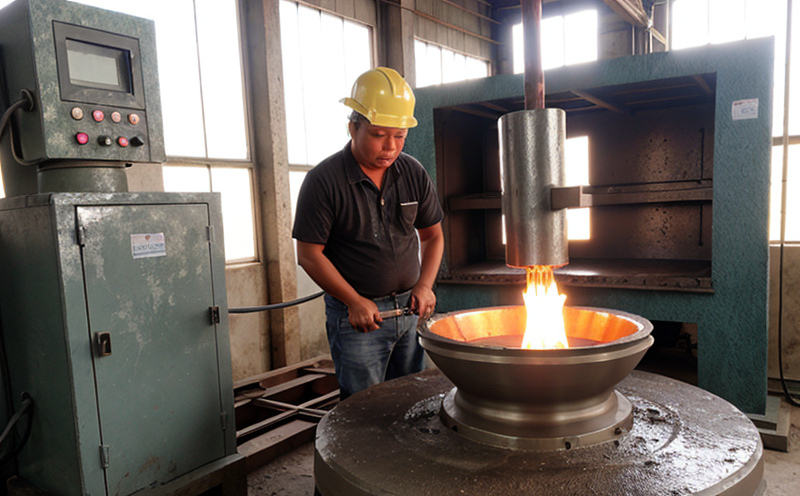ISO 8072 Gas Permeability Testing of Foundry Sand
The ISO 8072 standard provides a comprehensive method for determining the gas permeability properties of foundry sands. This test is crucial in ensuring that the sand used in casting and foundry processes meets stringent quality standards, which are necessary to produce high-quality castings.
Foundry sands play a vital role in the production process by providing the mold into which molten metal is poured. The properties of these sands, particularly their gas permeability, significantly influence the integrity and quality of the cast products. Poor gas permeability can lead to defects such as porosity, slag entrapment, and excessive shrinkage during solidification.
According to ISO 8072, gas permeability is measured by subjecting a cylindrical specimen of sand to a controlled pressure differential while measuring the volume flow rate of gas passing through it. The test setup typically involves placing the sample between two plates with a known surface area and applying varying pressures. Over time, this allows for the determination of the sand's resistance to gas flow.
Specimen preparation is critical in ensuring accurate results. Prior to testing, the foundry sands must be conditioned according to ISO 8072 specifications. This involves drying or conditioning the sand at a specific temperature and humidity level over a defined period to ensure consistency across samples.
The apparatus used for this test includes a permeameter, which is designed to apply pressure differentials across the sample. The system must be capable of maintaining precise control over both the pressure applied and the gas flow rate. Additionally, it should have the capability to measure the volume of gas passing through the specimen at various pressures.
The acceptance criteria for this test are based on the permeability index, which is calculated as the ratio of the measured gas flow rate to a reference value derived from standard sand samples. The acceptable range for the permeability index depends on the specific grade and type of foundry sand being tested. Compliance with these standards ensures that the sands meet the necessary requirements for casting processes.
Understanding the implications of poor gas permeability is essential for quality managers, compliance officers, R&D engineers, and procurement teams involved in industrial manufacturing and processing. By ensuring that the sand used meets the specified standards, they can minimize defects and improve the overall efficiency of the casting process.
Why It Matters
The gas permeability properties of foundry sands are critical for several reasons. Firstly, it affects the ability of gases to escape from the mold during the casting process. Poor gas permeability can lead to the entrapment of gases within the cast product, causing defects such as porosity and slag inclusions. These defects not only reduce the aesthetic appeal but also decrease the mechanical properties of the final casting.
Secondly, gas permeability influences the cooling rate and shrinkage behavior of the molten metal during solidification. A higher permeability allows gases to escape more easily, which can prevent internal stresses from forming in the cast product. This is particularly important for large or complex parts where stress cracking could occur if not properly managed.
Finally, compliance with ISO 8072 standards ensures that foundry sands are consistent and reliable across different batches and suppliers. This consistency is crucial for maintaining quality control in industrial manufacturing processes. By adhering to these standards, manufacturers can ensure that their products meet the required specifications and perform consistently.
Benefits
- Enhanced Product Quality: Ensures that castings are free from defects such as porosity and slag inclusions, resulting in higher quality products.
- Improved Process Efficiency: By minimizing internal stresses due to proper gas escape during cooling, the process becomes more efficient with less waste.
- Consistent Performance Across Batches: Ensures that all batches of foundry sands meet the required standards, leading to consistent product quality.
- Compliance with Standards: Adherence to ISO 8072 ensures compliance with international standards and can enhance a company's reputation in the market.
Why Choose This Test
- Precision: The ISO 8072 method provides precise and repeatable results, ensuring that the gas permeability of foundry sands is accurately measured.
- International Recognition: Adherence to this standard ensures that the test results are recognized globally, facilitating international trade and collaboration.
- Comprehensive Data: The test provides comprehensive data on the gas permeability of foundry sands, allowing for informed decision-making in quality control processes.
- Supports Innovation: By ensuring that the sand used meets high-quality standards, this test supports ongoing research and development efforts aimed at improving casting techniques.





